Have you ever heard that if an agency is interested in you, that you don’t have to pay anything?
Yes!
Where did you hear that?!
On America’s Next Top Model?
I mean, if Tyra said it, it must be true, right?

Let’s think about this for a minute.
Last week I was talking to my friend, who is an agent in New York City. He just started working with a brand new model that he signed.
I was excited about the new model, so of course, I started asking him questions.
So, tell me about your new model!
Well–he looks like a model, so that’s good, but he needs to work on his body, so I set him up on a diet and a workout plan.
His photos that he took will never work for the clients that I work with in New York, so I have to send him out on test photoshoots with photographers I know to start building up his portfolio.
And since he doesn’t know his way around New York, I’m going to have to spend at least a day getting him acclimated to the city.
Wow! That’s a LOT!
He also needs a portfolio book and comp cards so that when he’s ready to be seen by clients I work with so that I don’t look like an idiot.
OK–so how much does all of this cost? How long do you think it will take before he starts booking paying jobs?
That depends on him…how strictly he sticks to the plan that I have for him and how quickly he learns the ropes.

So–who pays for all of this? That’s a lot of time and money!
I’m going to explain precisely how investing in new talent works for an agency, but first, let me tell you another story so that it makes sense for you.
I met a new model named Judy at a networking event in Los Angeles. When I met her, I thought she was super cute, but she was attending a university in New York.
She met an agent at the event who signed her. Pretty quickly, she decided to drop out of the university and move to LA to model full time.
When we first started talking, all she wanted to do was walk the runway–like in New York, Paris, or Milan for Fashion Week.


The problem was that she was 5’10” and a size 6.
Now, you may be asking yourself, “Where’s the problem?”
When designers create clothes for Fashion Week, they make them to fit one body size…usually size 0-2 and someone who is 5” 10”-6’ tall.
The other problem–runway models, as glamorous as it appears, don’t get paid well…usually under $500 per show.
That includes castings, go-sees, fittings, rehearsals, and the show.
Yes–there is a lot of press for those shows which can lead to significant campaigns for the designers…but the chances of that happening are pretty slim.
Back to Judy.
When she moved to Los Angeles, she had a lot of opportunities for commercial print modeling. She did work for catalogs and commercial magazines that paid well. I remember seeing her in a Target ad and was so proud of her!
Another way that she was able to make a consistent income was through showroom work.
You see, designers create clothing lines to sell to clients, and they need models to show off the clothes. In this line of work, you can earn $200-500 per hour.

Yes, you read that, right!
The last I heard, Judy is living in a great apartment in Hollywood, working every day and enjoying being around fashion all day.
Let’s go back to my friend, the agent.
He told me something that made me think.
He said, as much as I want to help everyone, at the end of the day, I’m running a business.
I only work with people who take this as seriously as I do. If I just gave my services away for free, why would anyone put in as much effort as I do?
In the beginning, it’s not their name on the line, it’s mine. Who knows John Smith from Nebraska? No one. They know me.
So, if I send this boy on a job and he is late, doesn’t show, or shows up looking different from the photos I submitted to the client, I’m the one getting the angry call from the client.
Then, I won’t be getting any more calls from that client. Does that make sense?
When I was first getting started, I tried developing models at my expense…then the great model debacle happened…and I never made that mistake again.
Uh-oh. What happened?
Well, I booked one of my boys for a huge client that I can’t name. The client had everything set up–photographers, makeup artists, hairstylists, a beautiful studio, and all of the products set up and ready to go.


I had given the model the address and call time the night before.
Then. He. Didn’t. Show. Up.
At 6 AM on a Saturday, I woke up to a client screeching in my ear because my model didn’t show up.
I called him on repeat, but he didn’t answer the phone.
Really? What?
Yeah. Now the client was out tens of thousands of dollars–this was a massive shoot.
I was out a significant client.
And my boy was MIA.
What happened to him?
When he finally got around to returning my call, he told me that he was out with his friends after he had spoken to me, and he dropped his phone in the pool.
I freaked out on him and dropped him faster than he dropped his phone in the pool.
Because of his stupidity, I lost a major, lucrative client, just like that.
Do you know what happened to him?
Yeah–he’s waiting tables in Omaha.
When an agency spends time developing a new model–getting the model in shape, sending you on test shoots with photographers, building your portfolio and your image–they are doing it in the hopes that both of you will make money.
As a model, you are your own business–you are a small business owner.
If you wanted to open a business, you’d have to pay the start-up costs: training on the service you provide, rent on the office, furniture to put in the office, computers, printers, internet, office supplies–, and that’s just the beginning.
You don’t just wake up one day and BAM! You’re a business owner. It takes work, and it costs money.
It’s the same for a model. The gym you go to expects you to pay their fees every month; the grocery store needs to be paid for the healthy food you’re eating. Photographers have to be paid for their services. Makeup artists and hairstylists have to pay their bills. Portfolio books and comp cards don’t grow on trees.
Getting started as a model–one that will eventually make good, consistent money like Judy–isn’t cheap.
Successful people believe in themselves–they believe in their value and their ability to deliver it.
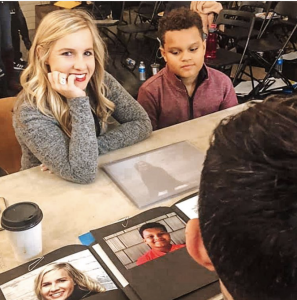
Unsuccessful people don’t… that’s why they need guarantees. Some people call this an abundant mindset versus a poor mindset.
Which one are you?
“Rich people are willing to act in spite of fear…poor people let fear stop them.”

Either you are a person who will be stopped or a person who will not be stopped. You choose. Now it’s time for you to choose. Who would you rather be?
It all starts with what’s inside of you–more specifically, your mind.
Your thoughts lead to your feelings. Your feelings lead to your actions. Your actions lead to your results.
Either you control your thoughts or they control you.
So many girls are so desperate to be models that they open themselves up to trouble. Predators know this.
Human traffickers routinely post fake modeling jobs online. They reach out to girls on portfolio building websites so that they can begin grooming their victims.
They will offer the young girl drugs and alcohol and maybe even buy them expensive clothes to earn their trust. They will push their limits more and more.
Some modeling jobs posted online actually end up being porn shoots where they coerce the girl into filming scenes.
Even if you don’t run into a trafficker, you most definitely will run into someone who sexually harasses or assaults you. Being signed with an agency doesn’t guarantee protection…so you always have to be careful. Many girls have been sexually assaulted, and nothing happens; agencies don’t want to lose clients.
If you believe that an agency is like a fairy godmother that grants your wishes and that’s not true, then you need to shift your thoughts.
When you are pursuing a career in modeling, you have to have the right mindset. The moment that you shift your thoughts to say, “I need to invest in myself so that I can become the type of a person that an agency wants to work with…” that is the moment that your journey to success begins.
When Tyra Banks said that if a model gets signed by an agency, they shouldn’t have to pay upfront fees, they overlook the most critical word in that sentence. She said, a model. Not an aspiring model. Not someone who is thinking of being a model. A model.
If you’re an aspiring model who has booked no work, your job is to become the person that an agency wants to work with. You have to start building your portfolio. You have to start booking work in your local market.

Your job is to show them you are a working model, not one who sits around waiting for someone to do the work. Show them that your work is getting noticed and that you take your career seriously. Talking about how you take your career seriously is very different than actually getting out there and working.
As you continue to train, add to your resume and update your portfolio. Learn as much as you can about the business and be proactive…book test shoots, go on castings, book work in your local market.
If you want to be a successful model, do what other successful models do.
Now, for those of you who are reading this, you’re loving the information about modeling, but you’re like, hey, wait–but I want to be an actor…don’t worry–I’ve got you covered!
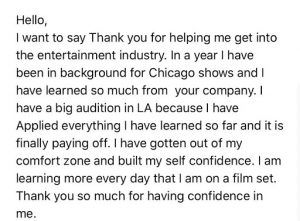
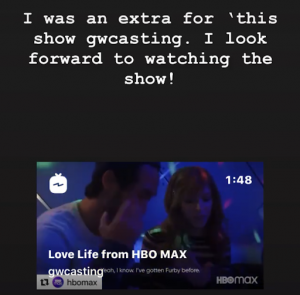
You should be in an acting class a minimum of two to three times a week, training as if you were preparing for the Olympics. Casting directors, producers, directors, and network executives only hire the best for professional television and film work…and the best are always prepared.
Do you think that Tom Cruise would ever walk into a room without being the most prepared person in the room?
It’s OK to have dreams, but you need to act on them realistically. If your acting training comes second, you will not be able to beat other great actors in the audition room who are working ten times harder at their craft than you are. Keep challenging yourself.
I always tell actors that when they take an acting class, they should be the worst actors in that class when they start.
Stay in that class until you’re one of the best, then move onto another course where you are again one of the worst in the class. Train there until you’re one of the best still.
That is how you will keep growing and expanding as an actor. Actors who are always improving have a better chance of booking important TV and film work.
Show business is a numbers game.
People won’t talk about it often, but I will. Many actors get jobs in film, television, web series, and commercials. However, there are also actors we sign who don’t ever get work.
And if you don’t get work, that’s a problem.

Typically, talent managers will work with actors for a couple of years. Suppose they don’t see you getting tangible results that include lots of auditions, or callbacks on your auditions, or booking the jobs. In that case, they will make the hard decision to let you go.
Perhaps another manager can do something different for you. Suppose you aren’t giving your representative great headshots, acting clips, and persuasive skills. There are thousands of other actors waiting in line to replace you on the roster.
You see…it all comes down to a numbers game.
For example, if a manager has 50 clients on their roster, they need all 50 of them to have at least one job per month that they are getting paid for. If you are not getting one gig a month, you might be in the wrong business!
Managers and agents focus on the actors who are booking work.
Don’t let this hurt your feelings, but agents and managers tend to focus on the actors who are making them money.
These are the actors who are always seriously training, providing updated headshots, and giving new acting clips and regular bookings that they can pitch with.
Suppose you aren’t booking jobs and making money. In that case, there may be many reasons why: you aren’t hustling enough, not getting the right coaching for your auditions, your headshots might not be working, you aren’t networking with industry producers, writers and directors enough, you’re not doing theater and getting exposure, you’re not booking commercials and getting exposure, or you’re not creating your own content.
Those who take massive action get massive results.
What action can you take, right now, to start getting massive results?
Actors are expected to get callbacks, get pinned, or book the job at least 40% of the time.
Fact: Agents and Managers are in this to make money.
Don’t be naïve. Yes, they love the creativity and beauty of show business. But make no mistake about it: everyone is in this to make money. If you are not making your reps money, you will be dropped.
Their first effort when seeing this problem is to analyze all of the above and see if they can get you on the right track so you can start booking the jobs and making money. Once that happens, everyone is very happy!
But if you don’t start making money, you have to go.
Remember, managers get paid by earning a commission over everything you do in the entertainment business when you book a job in a: web series, paid play, voice-over, live singing or dancing gig, endorsement deal, extra work, feature film, short film, student film, TV episodic, commercial and merchandising. You need to be thinking about making money for yourself and your manager.
If you’re not thinking about making money, you are not the right fit for a management agency.
Every client should be making a minimum of $500 a month from all of the above. Some clients make much, much more. Series regulars make tens of thousands of dollars a week.
Talent reps are working in this business to build stars that will make millions of dollars in advertising and endorsement deals.
Show business is not a charity. Everyone wants to make money. If you are not thinking that way, it’s time to recalibrate your mindset. This is not a hobby. Get out there and get jobs. Hustle, work hard, be tenacious, and never give up.
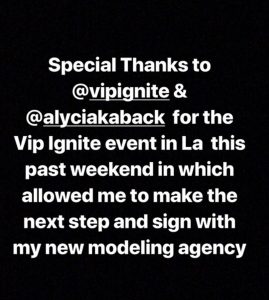
Too often, actors are in the clouds thinking that this business is just about dreams and creativity.
Yes, it’s about those things also. But it’s called show business for a reason. Agents and managers are business people.
You don’t have to be a struggling artist; read books about making money.
Make a vision board, set goals with timelines, and keep your commitments.
It’s OK to make money in this world. A lot of people have some sort of hang-up in that area. Get over it. If you want to be successful in show BUSINESS, you need to learn how to make money.
So, how do you put all of the pieces together?
How do you meet the right people?
How do you know if someone is legit or not?
The answer is simple: you have to network with the right people.
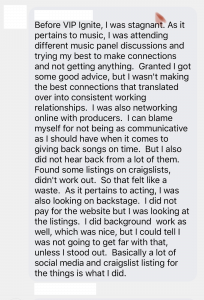
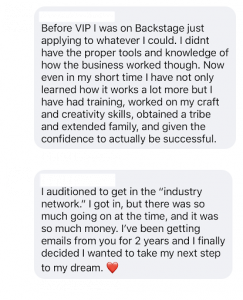
In the entertainment business, people often say that one must network or not work. To a large extent, they are right. And not just in show business, but in any industry. In show business, the importance of networking is particularly high.
Having a reliable network of colleagues and like-minded professionals to interact with can pay dividends in many different ways. The economy is changing, and the way people work is changing along with it.
Once upon a time, our parents and grandparents graduated from college, got one job, and worked that job until they retired. That’s not the way it is anymore.
Companies and whole industries are emerging and going under all around us.
Meanwhile, people don’t just change jobs; they often change careers entirely. In this kind of economy, the importance of networking, both online and offline, is integral to one’s long-term survival in the job market.
Online networking resources like LinkedIn, Facebook, and Instagram are essential tools these days. Use them as tools, not as a way to keep up with your friends and family. They help you to network online, to keep yourself in front of industry people and they also help you to find out about offline networking events like mixers and industry happy hours.
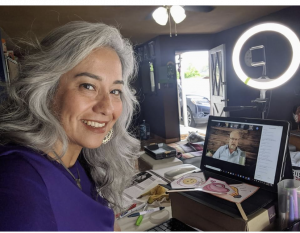
Taking a proactive approach to networking can help you find the career you truly want. That means exchanging contact information with people, starting a database of the contacts you make, and following up with those consistently.
You never know how someone you meet today can help you down the way. Make sure that you are adding value, not just taking from the new contacts that you make. You’re not collecting names like baseball cards…you are building relationships. People are less likely to help you if they feel you are only out for yourself.
Also, remember that it’s important to network even if you already have a job. In show business, you have to remember that your next job isn’t guaranteed. You can’t wait for life to happen–you have to be actively creating the experience that you dream.
That is something that we at VIP Ignite have perfected over the past 10+ years.
Want to know if you have what it takes to be a model, actor or musician sign up for our next FREE online virtual evaluation


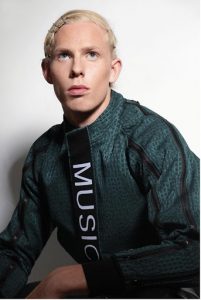


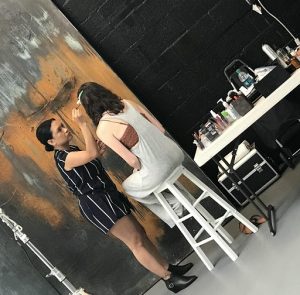


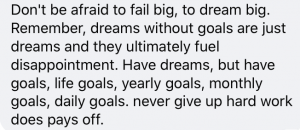
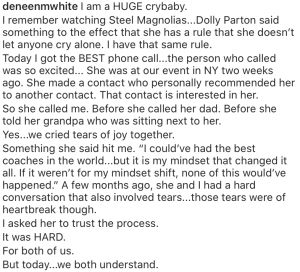

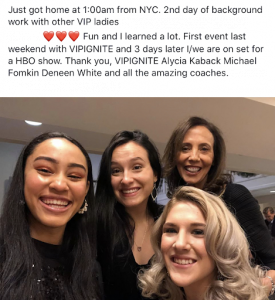


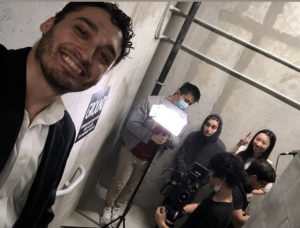

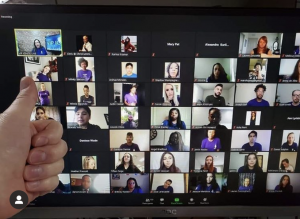

Recent Comments